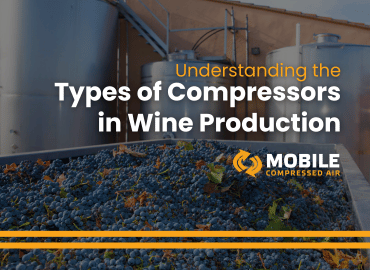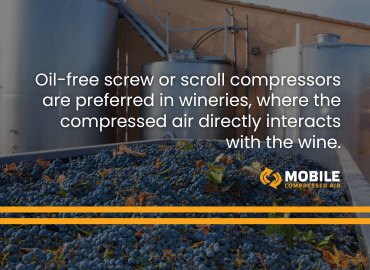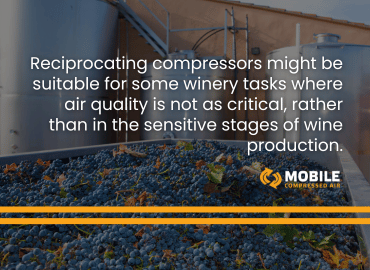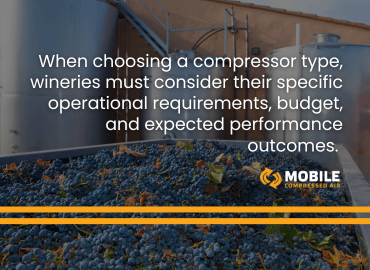Understanding the Types of Compressors in Wine Production
When selecting compressors for your winery, understanding the various compressor types is crucial for making an informed decision for your specific operational requirements and quality standards. Wineries commonly use reciprocating, rotary screw, or scroll compressors. Each type of compressor has its advantages and drawbacks, and choosing the right one depends on the unique needs and priorities of your winery.
Reciprocating or Piston Compressors for Wineries
Reciprocating compressors function through piston-driven motion, drawing in air, and compressing it using a back-and-forth piston action. Piston compressors should only be used where small amounts of compressed air are required and the air quality is of no great concern.
Strengths of Reciprocating or Piston Compressors for Wineries:
- Cost-Effective: Reciprocating compressors are more affordable, making them an attractive option for smaller wineries or operations with budget constraints.
- Durable: Piston compressors are robust and have a simpler design, making maintenance and repairs more straightforward.
Weaknesses of Reciprocating or Piston Compressors for Wineries:
- Lower Efficiency: Compared to other types, reciprocating compressors are less efficient, especially in larger-scale wineries, leading to higher energy costs.
- Operating Time: Reciprocating air compressors need downtime to cool down. For this reason, they need to be oversized for the application.
- Vibration and Noise: Piston compressors generally produce more vibration and noise during operation, which might be a concern in certain winery settings.
- Limited Air Quality Control: Standard reciprocating compressors do not inherently provide oil-free air. However, some models come with filtration systems to remove oil and contaminants.
Usage in Wineries: Piston or Reciprocating compressors might be suitable for some winery tasks where air quality is not as critical, such as general utility purposes rather than in the sensitive stages of wine production where compressed air is in direct contact with the wine.
Rotary Screw Compressors for Wineries
Rotary screw compressors use intermeshing helical screws to compress air continuously, providing high efficiency and a constant airflow. Oil-free models ensure clean compressed air suitable for winemaking’s critical stages.
Strengths of Rotary Screw Compressors for Wineries:
- High Efficiency: Rotary screw compressors are known for their high efficiency, making them suitable for applications with higher air demands.
- Continuous Operation: Screw compressors can operate continuously, providing a constant flow of compressed air without fluctuations.
- Less Vibration and Noise: Typically, rotary screw compressors are quieter and have fewer vibrations than reciprocating compressors.
- Air Quality: Oil-free models are available, specifically designed to produce clean and oil-free compressed air needed for winemaking.
Weaknesses of Rotary Screw Compressors for Wineries:
- Higher Capital Cost: Rotary screw compressors come with a higher upfront cost than reciprocating compressors, which might be a limitation for smaller wineries.
- Specialised Maintenance: Maintenance of screw compressors is more intricate, and servicing requires specialised knowledge or professional assistance.
Usage in Wineries: Oil-free rotary screw compressors are preferred in wineries because maintaining high air quality is essential in processes where the air directly interacts with the wine such as aeration, filtration, and bottling. Their high capacity and efficiency make them more suitable for medium to large wineries.
Scroll Compressors for Wineries
Scroll compressors operate with spiralling scrolls that trap and compress air, offering reliability, reduced vibration, and noise. Oil-free scroll compressors are suitable for maintaining the air purity needed in wine production.
Strengths of Scroll Compressors for Wineries:
- Compact and Quiet: Scroll compressors are known for their compact size and quiet operation, making them suitable for wineries where space and noise considerations are important.
- Reliability: Scroll compressors often have fewer moving parts, which can lead to improved reliability and reduced maintenance needs.
- Air Quality: Like rotary screw compressors, scroll compressors also have oil-free versions available, ensuring the delivery of clean, uncontaminated compressed air.
Weaknesses of Scroll Compressors for Wineries:
- Limited Capacity: Scroll compressors have limited capacity compared to rotary screw compressors.
- Higher Initial Cost: While less expensive than rotary screw compressors, scroll compressors have a higher initial cost compared to reciprocating compressors.
Usage in Wineries: As with rotary screw compressors, oil-free scroll compressors are ideal for wineries requiring high-quality clean air for wine production processes. Their lower initial cost, compact size and capacity make them more suitable for smaller wineries.
Compressed Air Quality in Wine Production
Maintaining air quality is paramount in wineries, particularly in critical winemaking stages like aeration, filtration, and bottling. Compressors that deliver clean, oil-free air are essential to prevent contamination that could compromise wine quality. While reciprocating compressors lack inherent oil-free air, both rotary screw and scroll compressors offer oil-free versions, ensuring the delivery of clean, uncontaminated compressed air. This aspect is vital in meeting regulatory standards and preserving wine taste and aroma.
Understanding these strengths and weaknesses is crucial for wineries to decide on the most suitable compressor type based on their specific operational requirements, budget considerations, and expected performance outcomes. Contact us for expert guidance on choosing the right type of compressor for your winery or read more Compressor Selection Guide for Wineries: Finding the Perfect Fit.
Mobile Compressed Air is a compressor sales and servicing specialist based in Adelaide. With an extensive history in servicing the most prominent winery brands in South Australia, our tailored compressors are crafted to meet the specific demands of winemaking processes. Our longstanding commitment and specialised expertise make us the trusted choice for delivering reliable, industry-tailored compressor solutions across diverse winery operations.




